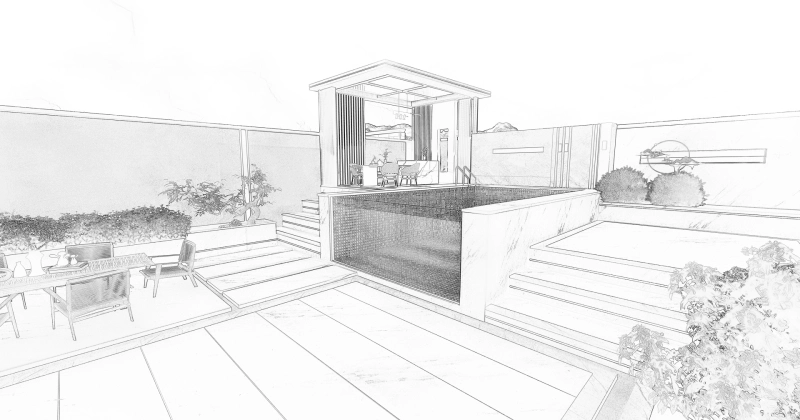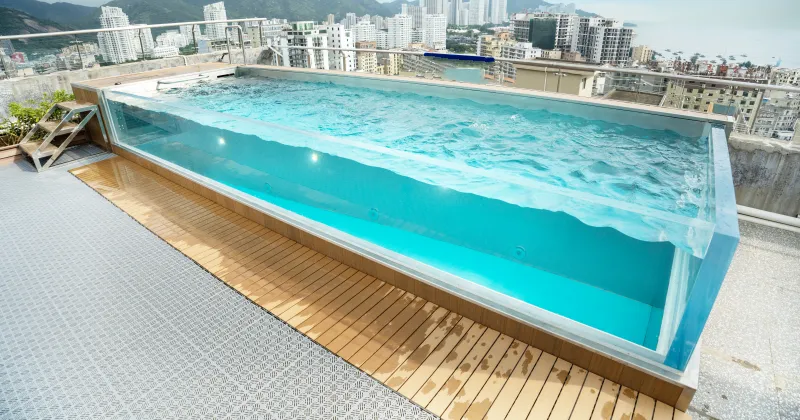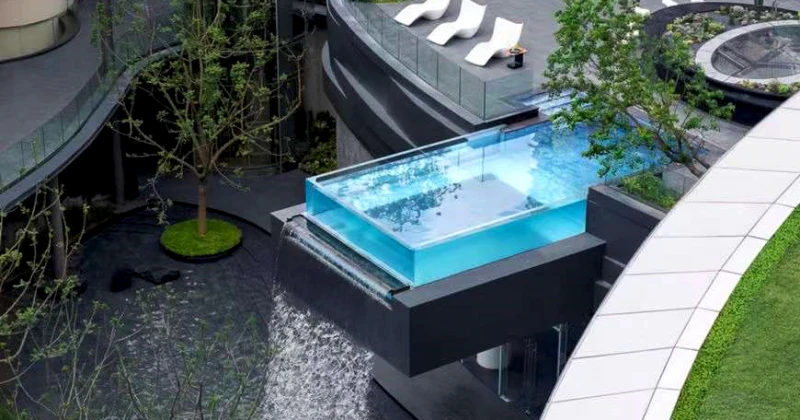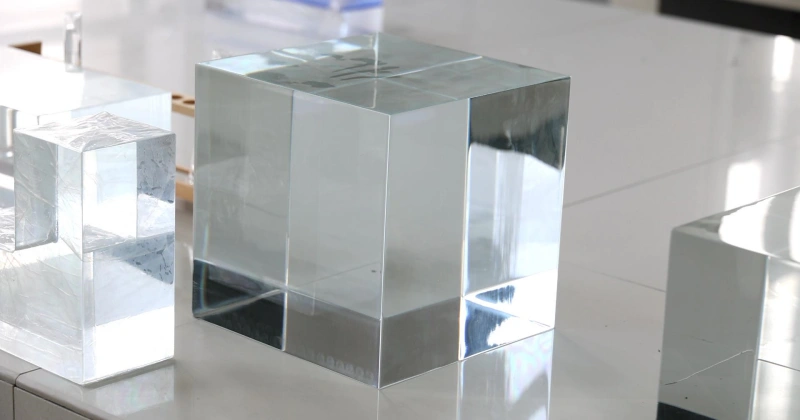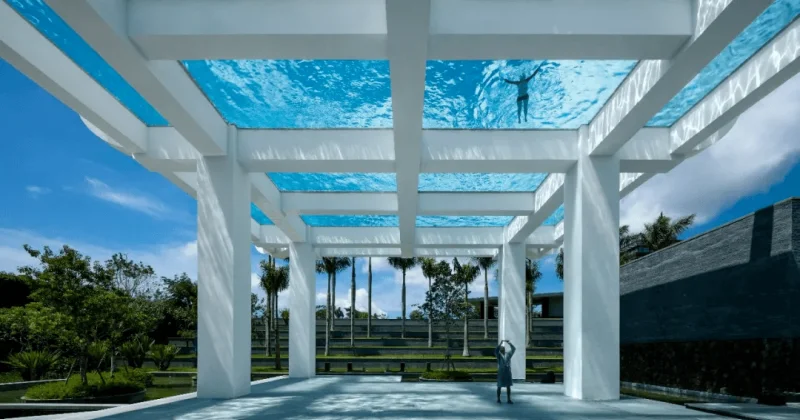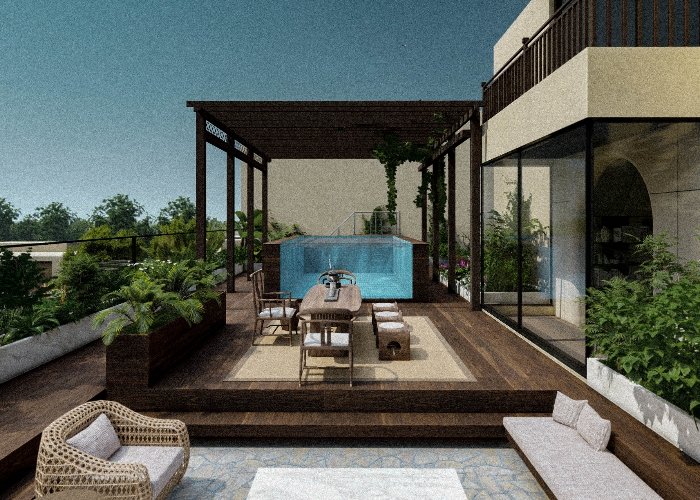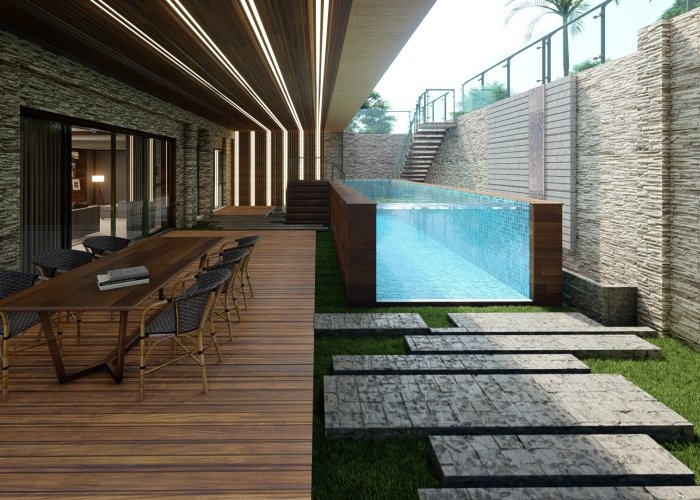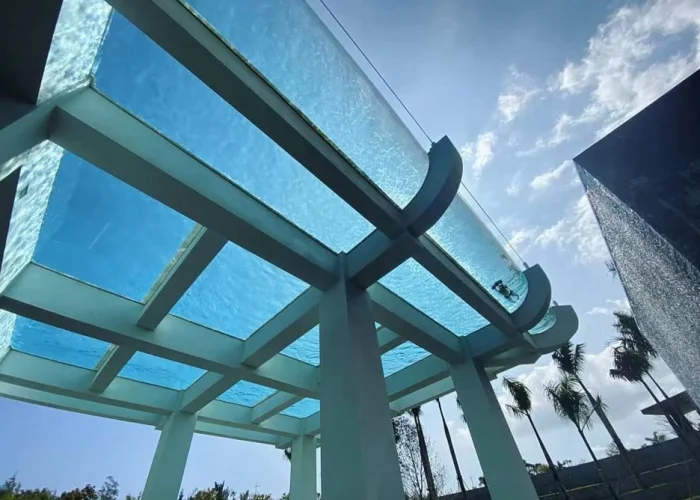
The Ultimate Showdown: Acrylic vs. Glass Pools
Introduction
Regarding modern swimming pool design, two materials stand out: acrylic and glass. Each brings its unique characteristics to the table, making them popular choices for homeowners and designers alike. In this article, we dive deep into what sets these two materials apart, helping you decide on your next pool project.
You'll learn:
- Key characteristics of both acrylic pools and glass pools
- A side-by-side comparison of their durability, aesthetics, installation time, and cost
- The pros and cons of choosing each material
- Important factors to consider when making your decision
We'll provide a comprehensive analysis that covers everything from long-term maintenance implications to personal aesthetic preferences. Whether you're prioritizing practicality or looking for that wow factor in your pool design, this guide aims to equip you with all the information you need.

Understanding Acrylic Pools
Acrylic pools, made from PMMA (polymethyl methacrylate), offer a modern alternative to traditional pool materials. PMMA is a versatile plastic known for its impressive clarity and strength. This material is often chosen for its ability to be molded into various shapes and sizes, providing considerable flexibility in pool design.
Key Characteristics
Lightweight and Durable
- Acrylic pools are substantially lighter than glass pools, making transportation and installation easier.
- Despite being lightweight, PMMA is incredibly durable. Acrylic is up to 17 times more impact-resistant than glass, minimizing the risk of cracks or breaks.
Resistance to Corrosion and UV Damage
- Unlike some other materials, acrylic is highly resistant to corrosion. This trait makes it an excellent choice for pools since it can withstand the harsh chemicals used in pool maintenance.
- Acrylic also offers superior resistance to UV damage. Over time, exposure to sunlight can degrade many materials; however, acrylic maintains its structural integrity and clarity much longer.

Additional Benefits
Clarity and Transparency
Acrylic boasts an average light transmission of over 93%, ensuring exceptional transparency. This high level of clarity enhances the visual appeal of your pool, making the water appear crisp and inviting.
Energy Efficiency
One often overlooked benefit of acrylic pools is their insulation properties. Acrylic provides better thermal insulation than glass, which can help maintain water temperature. This energy efficiency translates to reduced heating costs over time.
Design Flexibility
The malleability of PMMA allows for custom shapes and intricate designs that might be challenging with other materials. Whether you desire smooth curves or sharp angles, acrylic can accommodate a wide range of design preferences.
Acrylic pools present an appealing option due to their combination of lightweight durability, resistance to environmental factors like corrosion and UV rays, and inherent versatility in design. These characteristics make them a popular choice among modern pool installations.

Exploring Glass Pools
What Are Glass Pools Made Of?
Glass pools are made using tempered safety glass, a type of glass that's much stronger and more durable than regular glass. This glass goes through a special process of heating and rapid cooling, which makes it resistant to breaking from heat or pressure. If it does break, it shatters into small, blunt pieces instead of sharp shards, reducing the risk of injury.
How Strong Are Glass Pools Compared to Regular Glass?
Here's how tempered safety glass stacks up against regular glass:
- Tempered safety glass is about four times stronger than regular glass.
- It's less likely to break under pressure or impact because of its enhanced strength.
- Regular glass breaks into sharp, dangerous fragments, while tempered safety glass breaks into tiny, harmless pieces.

Key Features of Glass Pools
1. Clear View
Glass pools offer unmatched clarity and transparency, giving you an unobstructed view of the water. This feature enhances the pool's visual appeal, creating a stunning effect.
2. Modern Look
The sleek and contemporary design of glass pools can elevate the look of any space. The clear walls can make the pool seem like it's merging with its surroundings, offering a luxurious and modern vibe.
3. Resistant to Scratches
Glass is more resistant to scratches compared to acrylic. However, if it does get scratched or damaged, tempered safety glass cannot be repaired and must be replaced.
4. Potential Tinting
One thing to keep in mind with glass pools is the possibility of a greenish tint due to the iron content in the glass. This might slightly change the visual aesthetics but doesn't affect overall functionality.

Why Is Installing Glass Pools More Complex?
Installing glass pools is notably complex because it often requires:
- A specialized team for precise cutting and fitting
- Extended timeframes for proper alignment and sealing
- Higher costs due to the intricate nature of the installation
These factors contribute to the higher initial investment needed for glass pools compared to their acrylic counterparts.

Comparing Acrylic vs. Glass Pools: A Side-by-Side Analysis
Summary Table of Key Characteristics
Characteristic Acrylic Pools Glass Pools Durability | Extremely impact-resistant, up to 17x stronger than glass | Tempered safety glass, 4x stronger than regular glass |
Aesthetics | High clarity (93% light transmission), customizable shapes and sizes | Excellent visibility, but may have a greenish tint |
Installation Time | Generally quicker and easier | More complex and time-consuming |
Cost | Lower overall cost | Higher overall cost due to material and installation complexity |
Pros and Cons Analysis
Advantages of Choosing Acrylic Pools
- Durability: Acrylic pools are highly durable, with superior impact resistance compared to glass.
- Design Flexibility: Easier to mold into various shapes and sizes, providing greater design freedom.
- Lightweight:Easier to handle and install due to their lightweight nature.
- Energy Efficiency: Better insulation properties help in maintaining pool temperature.
- Repairable Surface: Any scratches can be repaired through sanding.
Advantages of Choosing Glass Pools
- Strength: Constructed from tempered safety glass, offering substantial strength.
- Scratch Resistance: More resistant to scratches than acrylic; however, they cannot be repaired if damaged.
- Aesthetic Appeal: Provides excellent visibility with a sleek look, though some may have a slight greenish tint.
Disadvantages to Consider for Both Options
Acrylic Pools
- Susceptibility to Discoloration: May yellow over time due to sunlight exposure or unbalanced water chemistry.
- Scratch-Prone Surface: While repairable, acrylic is more prone to scratches compared to glass.
Glass Pools
- Complex Installation Process: Requires precise cutting and fitting by a specialized team, increasing installation time.
- Higher Cost: Both material and installation costs tend to be higher compared to acrylic pools.
Each material caters differently based on various needs in pool construction.

Factors to Consider When Choosing Between Acrylic and Glass Pools
When deciding between acrylic and glass pools, several factors come into play. Your choice will depend on your personal preferences in aesthetics versus practicality and long-term maintenance implications.
Personal Preferences in Aesthetics vs. Practicality
- Aesthetics: If you prioritize a sleek, modern look, both materials offer unique visual appeals. Acrylic pools provide exceptional transparency with high clarity, making them almost invisible when filled with water. Glass pools, on the other hand, offer a more classic aesthetic with their natural shine and slight greenish tint due to iron content.
- Practicality: Acrylic is generally more versatile in terms of design flexibility. Its ability to be molded into various shapes and sizes allows for custom designs that might be challenging with glass. Glass, while elegant, requires precise cutting and fitting, which can limit design options.
Long-Term Maintenance Implications
Acrylic Pools:
- Pros: Easier to repair if scratched; better insulation properties make them more energy-efficient.
- Cons: Susceptible to discoloration or yellowing over time due to sunlight exposure or unbalanced water chemistry.
Glass Pools:
- Pros: More scratch-resistant; does not discolor over time.
- Cons: Scratches cannot be repaired; and require specialized cleaning and maintenance due to their fragility.
Budget Considerations
- Initial Costs: Acrylic pools are typically less expensive initially compared to glass pools. The material cost and simpler installation process contribute to lower upfront expenses.
- Maintenance Costs: While acrylic may require occasional sanding for scratch repairs, it is generally easier and cheaper to maintain. Glass pools, though more durable against scratches, demand higher maintenance costs due to the need for specialized cleaning agents and procedures.
Considering these factors will help you make a more informed decision tailored to your specific needs and preferences.

Conclusion: Which Acrylic and GlassPool Material is Best?
When deciding between acrylic and glass pools, both materials offer unique benefits tailored to different preferences. Acrylic pools are ideal for those seeking durability, ease of installation, and energy efficiency. Glass pools excel in aesthetic appeal and scratch resistance but may require a more significant investment.
Evaluate your circumstances:
- Budget constraints
- Desired aesthetics
- Maintenance capabilities
Your choice will depend on your individual needs and priorities. Assess these factors carefully to make an informed decision.






